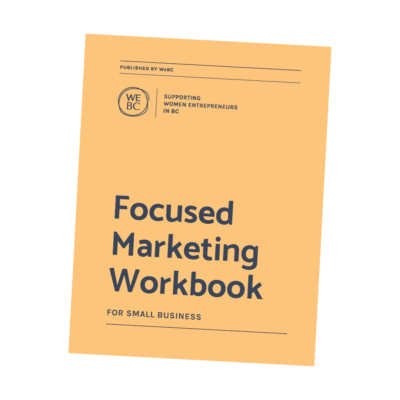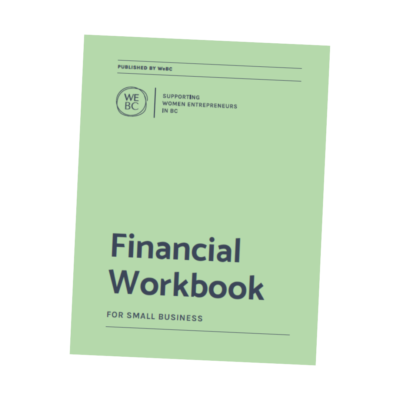Information You Should Always Include & Information You Should Always Leave Out of a Business Plan

There’s no getting around it, writing a business plan is a bit of an undertaking! If you have never written a business plan, it can be hard to know what to include. There are a lot of templates and guides available out there, but sometimes they’re so full of business-speak and jargon it can be hard to translate into the real world.
As a Business Advisor who has reviewed hundreds of business plans, I’m going to share some of the most important information you should always include and what information you should always leave out of your business plan.
A note before we get started—WeBC largely works with people who are writing a business plan as part of the process to apply for a business loan. As such, I’m going to cover how to write a business plan that will be read by a potential lender. But even if you’re not planning to apply for a loan, the core elements will remain the same.
Please see our guide, How to write a business plan for a full list of what we look for in a business plan.
What should you always include in your business plan?
Background about you and your journey
This may seem obvious, but your reader will want to know the most basic facts of your business, and the journey that has taken you to where you are today. Some people forget this part! This should include:
- How your business started (if you’re an existing business), and how your core offerings and business model have changed over the years
- Your company’s mission, vision, and goals. In other words, where is your business headed?
- Ownership structure and how long the owners have been involved in the business.
- Background information about you and other core employees or advisors. This should show the reader that your team has all the skills and knowledge for the business to succeed.
Market research
Most people know they should include market research in their business plan, but a common mistake is to keep the research too high level. For example, it’s good to know how many women there are between the ages of 30-40 in Canada, but how does that translate into sales for your store in particular? Here are some tips to beef up your research:
- It’s all about targeting. Your reader will want to know who your target market is, why they’re your target market, and how you are going to reach them. Check out our guide, which includes the 6 keys to common sense marketing for more on this, or learn more about how to target your marketing in this blog post.
- Whenever possible, try to include some primary market research. This means that you have to go out and gather your own data to show your reader that there will be enough demand for your product.
- Show that you understand your competition. What do they do better than you? What do you do better than them? It can sometimes be helpful to use a table or competitive matrix to organize this information.
- Be specific about your marketing plan. If your business plan says that you will promote your business using online advertising and you don’t provide additional details, that’s not going to be enough information. You should provide a sensible level of detail that shows the reader that you understand the ins and outs of your marketing channels, how much it will cost, and the sales you expect your efforts will achieve.

Focused Marketing Workbook
Do you feel tired and frustrated at the amount of money and effort this marketing requires? What if you could find a way to reduce the scatter, efficiently manage your time and get better results?
A breakdown of your financial plan and business model
Even if you’re not writing a business plan to apply for a loan, your business plan should include a breakdown of all the investments you plan to make in the next 1-5 years, as well as a breakdown of how you will make money.
- If you’re just starting up, or have a big project in mind, your business plan should include details of exactly what you plan to purchase and how much it will cost.
- Once you have an idea of the cost of your plan, you’ll need to identify your sources of funds—where will that money come from: Personal contributions? Debt? Equity investors?
- Lastly, your reader will want to see a breakdown of how you make money. You should be able to provide a summary of things like your pricing strategy, what your target margins are, and how you handle things like discounts or markdowns.

Financial Workbook for Small Business
This introductory-level guide takes you through practical exercises to help you understand the type of information financial statements provide.
What should you always leave out of your business plan?
At WeBC we’ve seen our share of business plans and have some thoughts on what makes a good one. Here are some highlights of what not to include in your plan.
Too much high level market research
I just finished saying that you should include market research in your business plan. Now I’m going to turn that on its head and say that you shouldn’t include too much market research! In particular, you do not need to include pages and pages of high level research about your industry. You do not need to spend money on expensive market research reports or pay someone to prepare analysis for you. For the most part, the market research we want to see is going to be specific to your business only—so you’re the best person to do the work.
Flimsy language
Sometimes when people are writing their business plan there is a tendency to want to tell the reader how great the business is. For example, they may write, “it’s an incredible business opportunity,” or “our products will be the highest quality in town.” Those are wonderful statements, but your reader probably won’t be convinced by words alone. There’s a saying I like, which is “show, don’t tell.” In other words, you will need to show the reader why it’s an incredible business opportunity, not just tell them.
For example, you could write “Last year, the only pizza restaurant in town closed down after a major fire. There is now an opportunity to purchase a former fish and chips restaurant and convert it into a pizza restaurant.” This gives the reader more background and shows why it’s a good opportunity.
Unrealistic projections
This is a common one—a business owner starts putting together their revenue and expense projections and next thing you know they are earning enough in their first year to retire in the Bahamas.
Don’t get me wrong, I want you and your business to be successful and earn as much as you can, but if your projections aren’t realistic, you’re not setting yourself up for success.
I usually suggest that people create two cash flow scenarios — an optimistic scenario and a pessimistic scenario. Ask yourself what it would look like if your business just covered its costs. What would you need to change in your business model to keep the business sustainable in that scenario?
Weak analysis of risk
All business plans should include a section that considers the key risks the business could face and how those risks would impact the business. However, sometimes people will provide a laundry list of risks without a real plan for how to manage them.
A common risk is that you won’t have as many customers as you anticipated. So if that happened to you, what would you do about it?
Too much visual filler
Everyone loves a nicely designed business plan. If design is your thing, then by all means, make that business plan as awesome looking as you can. But if your pages are more visuals than words (unless they are charts and graphs to present data) then the plan itself may be light on content. Remember, good design won’t be enough to distract from a flimsy plan.
Too many words
Like any other written document, a business plan needs to strike a balance between providing too much information and not providing enough. If your plan is 40 pages long and the pages are walls of text, you may find that your readers have a hard time making it through. They may start to skim or scan your plan instead of actually reading it.
There’s no magic fix to this, but a good approach is to ask a trusted friend or colleague for their honest opinion. Is it too long? Is it hard to read? If it is, there are many resources online that can help you learn how to thoughtfully edit your work to make it more concise. It’s worth the time and effort.
There it is! My top tips on what to always include and what to never include in your business plan. Hope you find these tips helpful.
Looking for more support to create your Business Plan?

Join us starting September 14, 2023, for a three-part webinar series, “Building your Business Plan: Formalize Your Ideas.” Our Business Advisor, Archana Samtani Singhania, will help you through the first steps of transforming your entrepreneurial idea into a viable business venture. Learn more >>>




